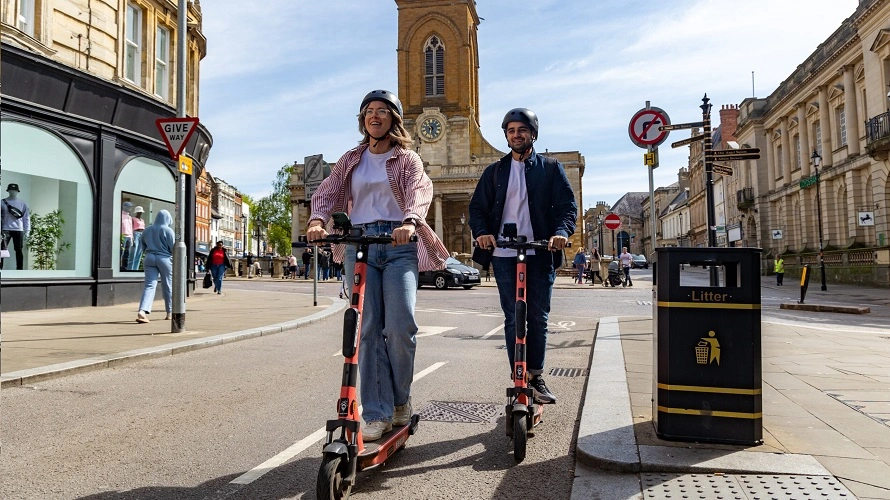Cenex, an organization established by the UK Government and the automotive industry with the aim of supporting the transition to low-carbon mobility, believes that a sustainable mobility plan should not merely seek to replace internal combustion cars with electric units.
The organization believes that there is a need to “rethink the issue at a systemic level” because a car remains parked 95% of its lifespan.

“We need to transition to new mobility services like shared mobility and micromobility,” comments Theodora Skordili, Business Development Europe at Cenex Nederland, in a conversation with Mobility Portal Europe.
“This may not be what car manufacturers like to hear, but it’s no longer about transitioning from internal combustion engine cars to electric ones because it won’t generate the necessary impact to meet the goals of the Paris Agreement, if we ever manage to do so,” she adds.
The reality is that the lack of incentives for the purchase of zero-emission vehicles and the potential imposition of a 10% tariff on exports of this technology between the EU and the UK will make it increasingly expensive to access a private car.
In July, Cenex joined more than 50 organizations, including local authorities, environmental charities, and operators, to send a letter to the Prime Minister urging the government to legalise e-scooters in order to promote micromobility.
Beth Morley, Mobility and Human Insights Manager at Cenex, said: “The need for legislation and regulations currently limits the potential of micromobility in the UK. Government should take action soon in order to keep riders and other road users safe by addressing issues like battery standards, training, and safe road usage.”
“Micromobility and e-scooters are an essential piece of the puzzle for decarbonising transportat; there is an opportunity for them to support public transport, private travel, and fleets,” she explained.
Another issue that the organization considers crucial for driving the transition is ensuring access to charging infrastructure.
That’s why the firm currently serves as the technical advisor to the UK Government’s Local Electric Vehicle Infrastructure (LEVI) Funding, valued at £400 million.
They are responsible for managing the country’s national Chargepoint Register and, on behalf of the UK Government’s Office of Zero Emission Vehicles, they also conduct technical and value-for-money audits of publicly funded chargers.
At the European level, Cenex also advises the Government of Greece on the development of its EV charging strategy.
Furthermore, they have conducted training sessions on these technologies, business models, and policy instruments to enable Eastern European countries to play a leading role in the transition.
The organization is a global leader in evaluating charging innovations, with a portfolio of over 15 bi-directional (V2X) and smart charging projects.
Projects in Latin America
In recent years, Cenex has gained experience in emerging markets in the transition.
One of the most recent projects is the Technical Assistance for the Development of an Electric Mobility Strategy in Buenos Aires, Argentina. This initiative is funded by the World Bank.
Additionally, the organization is working with 18 Governments of the Zero Emission Vehicle (ZEV) Alliance, including Chile and Costa Rica.
Through this project, they aim to create a vision for a charging infrastructure ecosystem that can efficiently, equitably, and conveniently serve the diverse needs of all electric vehicle applications in the mass market.
Lastly, they conduct customized training sessions on charging technologies, business models, and policy instruments to enable Uruguay to play a leading role in electric mobility within the region.
About Cenex
In addition to the UK, since 2018, the organization also operates from Amsterdam as Cenex Nederland, leading work in mainland Europe with support from the European Commission in relation to transport innovation.
Over the past 18 years, the firm has been working globally to provide expert advice to national, regional, and local governments, as well as the private sector, to assist them in making informed operational, environmental, and financial decisions regarding low-carbon transportation.
What services does it offer?
- Expert support for countries, regions, and cities to develop mobility strategies that meet climate and air quality objectives while supporting economic competitiveness and social inclusion.
- Combined assessments of zero-emission vehicles and energy infrastructure for public and private sector fleets, ranging from light vehicles to heavy-duty vehicles and non-road machinery.
- Energy modeling for electric vehicle charging, including the integration of renewable energy generation, energy storage, and grid balancing services.








